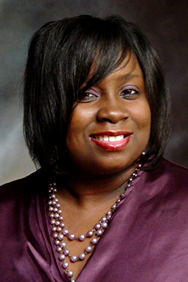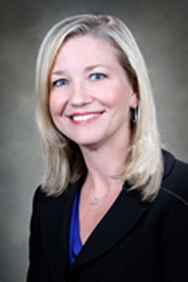Strategic Research Planning process is 'critical step' as Arnold School moves research program into the future
June 10, 2011
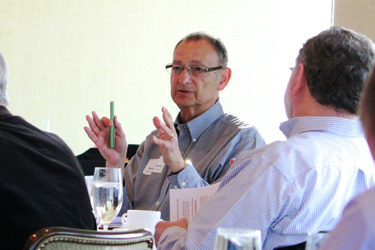
Dr. Moss Blachman, center, a noted
management consultant and coach,
has assisted the Arnold School in its
Strategic Research Planning process.
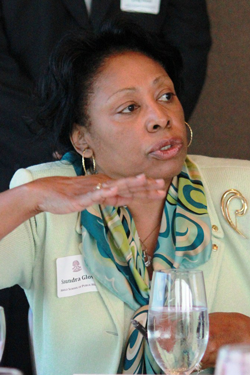
Dr. Saundra Glover, the Arnold School's
associate dean for health
disparities and social justice,
was among the participants at the
spring research retreat.
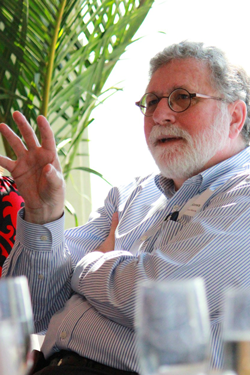 The school's spring research retreat was
The school's spring research retreat was
attended by many faculty, including
Dr. Robert McKeown, chair of the
Department of Epidemiology and Biostatistics.
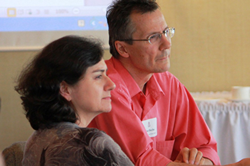
Dr. Myriam Torres, director of the
Consortium for Latino Immigration
Studies, and Dr. Alan Dech, director
of the Microbial Interactions Laboratory,
were among the Arnold School faculty
attending the spring research retreat.
The Arnold School of Public Health has undertaken an intensive study of its research programs to develop areas of established research excellence and areas of potential excellence in need of further investment and development.
The school's Strategic Research Planning process, under way since January 2010, was begun to ensure that decisions regarding research and faculty investments are aligned with the school's long-term vision and mission, said Dr. Tom Chandler, Arnold School dean.
"The strategic research planning process has been – and continues to be -- a critical step for the Arnold School as we build and elevate our stature as an impactful School of Public Health," Chandler said.
In its growth as South Carolina's only school of public health, the Arnold School has developed an established reputation in research, said Dr. Greg Hand, the Arnold School's associate dean for research and practice.
"Certainly, we have strengths and many faculty who are recognized for outstanding research across the public health disciplines," he said.
"However, we recognized that the Arnold School is at a point where we want to ensure that our strongest areas of research continue to grow and to focus on areas where we can achieve excellence with focused support and resources," Hand said.
In fiscal years 2009 and 2010, the Arnold School received more than $52 million in extramural contract and grant awards. In fiscal year 2011, the Arnold School is about 10 percent above extramural contract and grant funding over the same period last year. Faculty members have consistently produced 290 - 300 peer-reviewed journal articles in print annually. Among the University's health sciences colleges, Arnold School faculty members garner the most research dollars per individual researcher.
"Clearly, we are a recognized leader in research funding at the University," Chandler said. "However, it is important for us to examine the research culture of the school and to have a better understanding of our research infrastructure needs. By accomplishing this faculty-led review, we will better know how to enhance those research programs that are strong and how best to support other programs that have the potential for excellence."
But when Hand as associate dean for research began the process of looking at models for the Arnold School's strategic research planning process, nothing existed that met the school's specific needs.
"We decided that we would set our own course and develop our own model," he said.
The Arnold School turned to Dr. Moss Blachman of the USC School of Medicine for assistance. A well-known management consultant and coach for more than 25 years, Blachman has extensive experience in strategic management and planning.
After meeting with Hand and Susan Cate, the Arnold School's research office director, Blachman said he thought that the breadth of the Arnold School's strategic research planning initiative to be remarkable.
"What is even more unusual is that it has been a serious enterprise from the beginning," said Blachman, the assistant dean for continuing medical education and faculty development at USC's medical school. "It has been taken seriously by the school's leadership and all others who are involved in the research effort. It isn't often that we see this kind of commitment."
The strategic research planning process also has been transparent and has encouraged widespread participation from the outset, Blachman said.
That transparency has included the Strategic Research Planning link on the Arnold School's Web site, placed so that all interested individuals would have access to meeting notes and draft reports, Hand said.
"Everything from the process is online," he said, "and people have the opportunity to give feedback. In fact, we have encouraged feedback and actively sought it."
At the initial strategic research planning retreat in March 2010, faculty participants identified physical activity/exercise research as strong in the Arnold School and highly recognized for excellence. They identified cancer/cancer prevention research and nutrition research as being on the verge of becoming strong with minimal additional resources, with both areas poised on the cusp of recognized excellence.
"Other pockets of high impact, competence and recognition exist throughout the Arnold School, and these areas are being targeted for investment where emerging opportunities exist for significant extramural funding support," Chandler remarked. "The ultimate goal here is to begin a long, overdue process of thoughtful planning for the wise use of limited state and federal resources for health over the long term."
The Arnold School identified four task forces to develop strategic planning reports for the Dean, Hand said.
These included the Research Culture, Sustainability, and Emerging Opportunities Task Force; the Physical Activity/Exercise Research Task Force; the Cancer/Cancer Prevention Research Task Force; and the Nutrition Research Task Force. Each task force met from spring through fall 2010 and developed four reports that were compiled and discussed at a retreat in April 2011 with Arnold School researchers.
These findings will move the strategic research planning process with clear goals, Hand said.
"We will continue our strategic planning by working with small groups, which will examine the steps that are needed to move our research program toward greater excellence, and we will make recommendations for action, implementation and a critical piece that is typically omitted – continued assessment of progress," he said.
"We will continue to strengthen our research infrastructure and look for opportunities for interdisciplinary research," he said. "And we also will look at areas of continuing opportunity, including research on global health, environmental quality, and health disparities."
Hand lauded the commitment of faculty and staff who have dedicated many hours to ensuring that the Arnold School's research program is one of excellence in multiple areas of the public's health.
"I am exceptionally proud of the senior faculty who volunteered to chair the task forces and the hard work of the faculty who participated in the groups," Hand said. "I cannot overstate the importance of Dr. Blachman's guidance in the process of strategic planning. I think we have all learned from his expertise and experience.
"Because of the individuals involved, this truly has become the Arnold School's own model. It is one that can be adapted by other colleges and schools," he said.
"Through this process, the Arnold School will build on areas of strength and enhance the programs that have demonstrated potential for excellence," he said. "All of our efforts will enable us to fulfill our commitment to improving public health within our state and nation and to impact the health of children and adults around the world."
Blachman said the Arnold School leadership took a bold step with this kind of focused initiative, and moved forward with determination.
"It has been a serious, sustained effort, and for that the school should be very proud," he said. "I am very honored to be part of this."
To learn more, go to http://sph.sc.edu and click on the Strategic Research Planning link.



_01.jpg)
